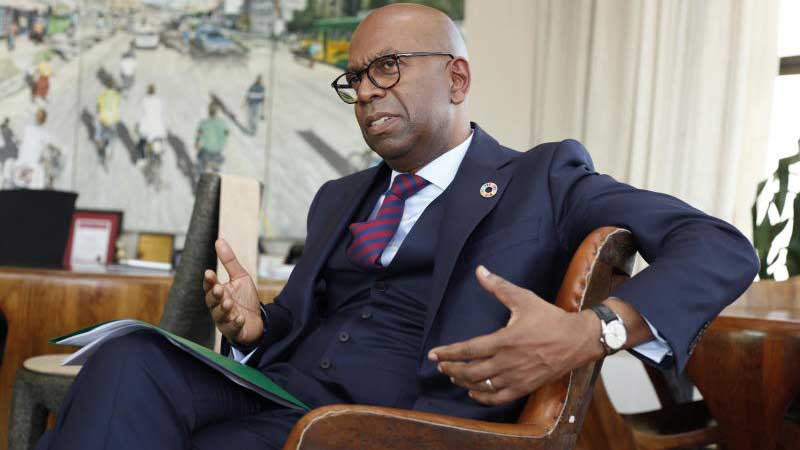
The calmly suave Safaricom chief executive Bob Collymore, 60, has opened up on his battle with cancer.
On Wednesday night he told Citizen TV’s Jeff Koinange a doctor had misdiagnosed his leukaemia for Vitamin D deficiency.
Collymore was making his second public appearance after a 9-month medical leave in London.
And like many cancer patients, his story began with a misdiagnosing in 2017.
“I had been feeling unwell for some time. I noticed a strange thing…I noticed a pain in the bones of my shin, which is not something you experience unless you kick something hard,” he told Koinange.
He would later begin shaking and notice flu-like symptoms, a condition his wife Wambui Kamiru thought was from Malaria.
“I went to a doctor who told me I was Vitamin D deficient and gave me supplements,” he said.
Unsatisfied by the diagnosis, Collymore sought a second opinion from Nairobi Hospital’s Dr. David Silverstein.
“He ran a series of about 30 different blood tests and it cost me $1,000 (Sh100,000)”.
Dr. Silverstein still did not establish where the problem was. He therefore admitted Collymore in Nairobi Hospital.
This was the first time Collymore was being admitted to a hospital, he told the television man.
Collymore narrated how they did a bone marrow aspiration (a procedure where bone marrow was removed from his body and tested). It was after this that he was told he could be having a problem with his blood.
General Elections
In spite of Dr. Silverstein’s recommendation that Collymore had to see a specialist in the United Kingdom urgently, he still wanted continue with work.
“I had the elections coming up and company year-end coming up a week later. I told the doctor I’d go soon after the activities,” he said.
Dr. Silverstein was adamant that Collymore should leave the country that very night.
Sensing the gravity of the matter, he left for UK and a haematologist diagnosed him with Acute Myeloid Leukaemia, a curable but rare cancer.
His doctor would reveal to him that he had had the disease for about six months.
“Being diagnosed with cancer for me was not such a big deal. If you get cancer, you can’t undo it,” Collymore added with a straight face.
Chemotherapy
After announcing his condition, Collymore started a rigorous chemotherapy routine for about six months.
“In February, I wanted to come home. My doctor said I could do so but in six months the cancer would be back and worse than before,” he said.
Dr Donald had he flown to Kenya, he would not have been placed on a curative programme but be maintained on chemotherapy until his dying day.
Was he worried at some point?
“I wasn’t upset about being diagnosed with leukaemia, I was kind of expecting it,” he said adding that it would have killed him if the find didn’t come early.
 The Standard Group Plc is a multi-media organization with investments in media
platforms spanning newspaper print
operations, television, radio broadcasting, digital and online services. The
Standard Group is recognized as a
leading multi-media house in Kenya with a key influence in matters of national
and international interest.
The Standard Group Plc is a multi-media organization with investments in media
platforms spanning newspaper print
operations, television, radio broadcasting, digital and online services. The
Standard Group is recognized as a
leading multi-media house in Kenya with a key influence in matters of national
and international interest.











